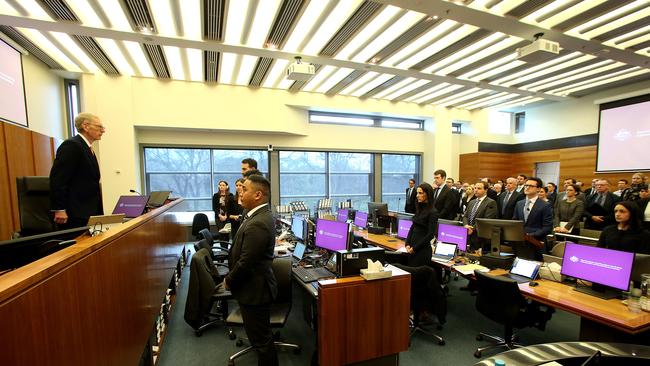Please Mr Hayne, heal the system
Ken Hayne should focus his brainpower on prescribing a much-needed cure for the festering financial advice sector.

After 12 months of grisly, gripping hearings into misconduct in the banking, superannuation and financial services industries, we can’t wait to see what he comes up with, especially since the likely next Treasurer, Chris Bowen, has committed Labor to implementing everything, sight unseen, while the less likely, but still possible, Treasurer, Josh Frydenberg, will be hard pressed not to do the same.
Hayne will no doubt use up some forests opining about executive remuneration and probably recommend changes, although it’s hard to see what legislation could be brought to bear on this. But as he wrote in the interim report: “the … premise … that staff and intermediaries will not do their job properly … without incentive payments, must be challenged.” So challenge it he presumably will.
He will no doubt also challenge the business models of mortgage brokers, as well as those of ASIC and APRA, and possibly, most sensationally, recommend criminal charges for some prominent citizens.
But I hope he spends most of his energy and brainpower suggesting a way to fix the regulation and structure of financial advice.
This is the biggest problem in financial services: the job of advisers is to distribute wealth management products, so that the regulation of advisers is historically structured around product distribution rather than expertise and independence.
That has been changing recently with the banning of commissions, the introduction of higher educational standards and the requirement to put the best interest of the client first (notwithstanding the sordid and happily futile efforts of the Coalition to repeal or gut these requirements).
The fact that AMP and the banks are allowed to employ financial advisers is a travesty, and if Ken Hayne doesn’t recommend that this be banned then the whole thing will have been yet another wasted opportunity, like the Murray Inquiry, and the Wallis one before that.
Hayne is the first person ever to have inquired into the financial system who wasn’t part of it. Campbell, Martin, Wallis, Murray and every single one of their panel members were all either from the banking and financial services industries or the big end of town. Hayne’s are the first truly fresh set of eyes, and they’re gloriously grumpy eyes at that.
So what can, or should, he do? It seems as plain as anything has ever been that banks and wealth managers should not be allowed to employ people who call themselves financial advisers or financial planners. They may employ product sales people who are clearly identified as such, but not “advisers” or “planners”.
Advisers should be individually regulated and licensed, not in corporate “dealer groups” as they are. That they are even called dealer groups is appalling, and the fact that they are allowed to be owned by a bank or wealth manager is doubly so.
What’s more, the sales people employed by wealth managers should not be allowed to deal directly with the public, but only with independent advisers, trying to persuade them to recommend their products, with strict rules around how they do that.
Think of the health system: advisers are doctors, wealth managers are drug companies, platforms are pharmacies.
Doctors (advisers) are strictly independent, licensed as individuals, and are only allowed to practice after years of study. Drug companies (wealth managers) are not allowed to advertise, their products are strictly controlled by the Therapeutic Goods Administration and they certainly are not allowed to employ doctors to prescribe their medicines for them. And pharmacies (platforms) can only hand over medicines (managed funds) in exchange for a prescription from a registered professional.
The key difference between health and wealth, apart from the educational standards and regulation, is that the better educated and more tightly regulated doctors are much cheaper than financial advisers, even before part of their fees are paid by the Government.
It’s not simply that the financial advisers and their employers are profiteering, although there is some of that of course, but the problem is mainly that the regulation and compliance demands on advisers are far too expensive.
It is virtually impossible for an adviser to charge less than $2000, whether it’s cash on invoice (rare) or more often a percentage of the funds under advice, through which rich clients subsidise less well-off ones. Compare that with the $100 or so visit to the doctor.
That sounds contradictory: am I not saying that financial advisers are insufficiently regulated? How can the compliance demands be more expensive then?
Simple. Regulation of financial advice has to make up for the inherent conflicts of interest in having advisers employed by banks and wealth managers, so the Statement of Advice is voluminous, expensive and usually unread. It would be as if when you went to the doctor with a cold that had turned into bit of a chest infection, and you had to have full blood tests, X-rays and MRIs before she could prescribe an antibiotic.
The reason doctors are cheaper is because the system can assume they are independent and have the best interests of patients at heart — that the doctors are not there primarily to distribute drugs but to look after people, so every doctor/patient interaction doesn’t have to be monitored.
And if we have learned nothing else from the royal commission, it’s that peoples’ wealth is just as important and vulnerable as their health.
So please Mr Hayne, make the financial system like that.
Alan Kohler is Editor in Chief of InvestSMART




Just four more sleeps until royal commissioner Kenneth Hayne delivers his final report to the Government. Many of the nation’s bankers may be spending those nights staring, not sleeping.